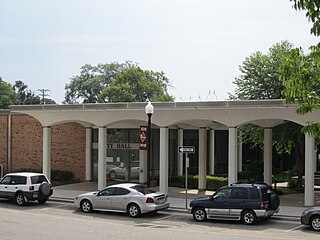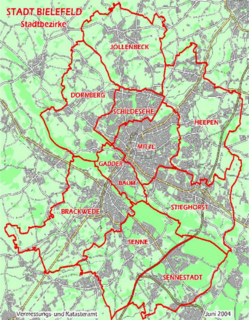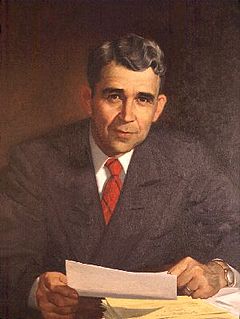This article relies largely or entirely on a single source .(January 2021) |
Hermann of Minden was a Provincial superior of the German province of Dominicans in the 13th century. [1]
This article relies largely or entirely on a single source .(January 2021) |
Hermann of Minden was a Provincial superior of the German province of Dominicans in the 13th century. [1]

Webster Parish is a parish located in the northwestern section of the U.S. state of Louisiana. The seat of the parish is Minden.

Minden is a small city in, and the parish seat of, Webster Parish, in the US state of Louisiana, United Stares. It is located twenty-eight miles east of Shreveport. As of the 2010 census, the city had a total population of 13,082.

Bielefeld is a city in the Ostwestfalen-Lippe Region in the north-east of North Rhine-Westphalia, Germany. With a population of 341,730, it is also the most populous city in the administrative region (Regierungsbezirk) of Detmold and the 18th largest city in Germany.
Minden-Lübbecke is a Kreis (district) in the northeastern part of North Rhine-Westphalia, Germany. Neighboring districts are Diepholz, Nienburg, Schaumburg, Lippe, Herford, Osnabrück.

Minden is a town of about 83,000 inhabitants in the north-east of North Rhine-Westphalia, Germany. The town extends along both sides of the River Weser. It is the capital of the district (Kreis) of Minden-Lübbecke, which is part of the region of Detmold. Minden is the historic political centre of the cultural region of Minden Land. It is widely known as the intersection of the Mittelland Canal and the River Weser. The town is over 1,200 years old and retains some buildings in the Weser Renaissance style, in addition to its architecturally symbolic 1,000-year-old cathedral.

The Battle of Minden was a major engagement during the Seven Years' War, fought on 1 August 1759. An Anglo-German army under the overall command of Prussian Field Marshal Ferdinand of Brunswick defeated a French army commanded by Marshal of France, Marquis de Contades. Two years previously, the French had launched a successful invasion of Hanover and attempted to impose an unpopular treaty of peace upon the allied nations of Britain, Hanover and Prussia. After a Prussian victory at Rossbach, and under pressure from Frederick the Great and William Pitt, King George II disavowed the treaty. In 1758, the allies launched a counter-offensive against the French and Saxon forces and drove them back across the Rhine.

Minden Hills is a township in and the county seat of Haliburton County, Ontario, Canada. It is an amalgam of the townships of Snowdon, Lutterworth, Anson, Hindon and Minden. It is usually referred to as Minden, after its largest community.

Robert Floyd Kennon Sr., known as Bob Kennon, was the 48th Governor of Louisiana, serving from 1952 to 1956. From 1954 to 1955, he was chairman of the National Governors Association. In 1955, he was also the chairman of the Council of State Governments.
Hermann von Mallinckrodt was a German parliamentarian from the Province of Westphalia.

The Province of Westphalia was a province of the Kingdom of Prussia and the Free State of Prussia from 1815 to 1946.

The County of Ravensberg was a historical county of the Holy Roman Empire. Its territory was in present-day eastern Westphalia, Germany at the foot of the Osning or Teutoburg Forest.

John Nicholas Sandlin, Sr., of Minden, Louisiana, represented Louisiana's 4th congressional district in the United States House of Representatives from 1921 to 1937.

The Prince-Bishopric of Minden was an ecclesiastical principality of the Holy Roman Empire. It was progressively secularized following the Protestant Reformation when it came under the rule of Protestant rulers, and by the Peace of Westphalia of 1648 given to Brandenburg as the Principality of Minden. It must not be confused with the Roman Catholic diocese of Minden, which was larger, and over which the prince-bishop exercised spiritual authority.

Otto IV of Schaumburg was a German nobleman. He was a ruling Count of Schauenburg and of Holstein-Pinneberg. He was a son of Jobst I and his wife Maria of Nassau, a daughter of Count Johann V of Nassau-Vianden-Dietz.

The Hamm–Minden Railway is an important and historically significant railway in Germany. It is completely quadruple track. It is a major axis for long distance passenger and freight trains between the Ruhr and the north and east of Germany. It is the part of the trunk line built by the Cologne-Minden Railway Company from Köln Deutz to Minden. It was opened in 1847 and has been modernized and developed several times since then.
The Nordwestdeutsche Philharmonie is a German symphony orchestra based in Herford. It was founded in 1950 and, along with Philharmonie Südwestfalen and Landesjugendorchester NRW, is one of the 'official' orchestras (Landesorchester) of the state of North Rhine-Westphalia. The orchestra has been shaped by conductors such as Wilhelm Schüchter, Hermann Scherchen and Andris Nelsons, has regularly served several cities in northwest Germany, toured internationally and recorded unusual repertory. Eugene Tzigane was conductor from 2010 to 2014, succeeded by Yves Abel.

Wehrwirtschaftsführer (WeWiFü) were, during the time of Nazi Germany (1933–1945), executives of companies or big factories called 'rüstungswichtiger Betrieb' . Wehrwirtschaftsführer were appointed, starting 1935, by the 'Wehrwirtschafts- und Rüstungsamt' being a part of the Oberkommando der Wehrmacht (OKW), that was pushing the build-up of arms for the Wehrmacht. The purpose of the appointment was to bind them to the Wehrmacht and to give them a quasi-military status.
Ernst Böcker was a German master craftsman, inventor and businessman. In 1908 he patented an apparatus for the acidification of dough and a little later developed a safe sourdough starter product for rye fermentation processes, revolutionizing the quality of rye breads and subsequently increasing the overall-quality of bread products.

Der Ring in Minden was a project to stage Richard Wagner's cycle Der Ring des Nibelungen at the Stadttheater Minden, beginning in 2015 with Das Rheingold, followed by the other parts in the succeeding years, and culminating with the complete cycle performed twice in 2019. The stage director was Gerd Heinz, and Frank Beermann conducted the Nordwestdeutsche Philharmonie, playing on the stage of the small theatre. The singers acted in front of the orchestra, making an intimate approach to the dramatic situations possible. The project received international recognition and was compared favourably to the Bayreuth Festival.

The Stedinger Crusade (1233–1234) was a Papally-sanctioned war against the rebellious peasants of Stedingen.